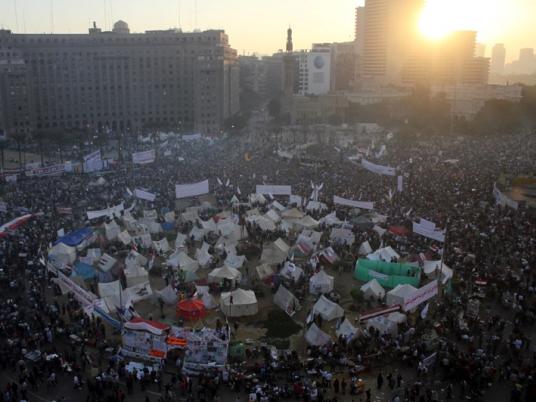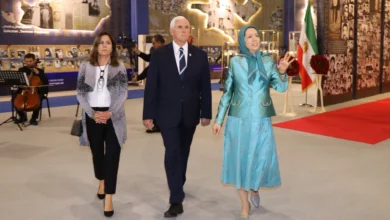
Sunday’s papers carry strong statements issued Saturday by weighty politicians on the bottleneck Egypt has been trying to pass through in recent months.
The Armed Forces, which was largely sidelined after President Mohamed Morsy was sworn into office on 30 June, reappeared in the political sphere issuing a warning statement on the country’s increasingly polarized situation.
State-run daily Al-Ahram leads with a story saying that Ahmed Mohamed Ali, official spokesperson of the military, warned in a statement posted on the Armed Forces’ official Facebook page of “catastrophic consequences” if the deepening political rift is not addressed.
Though the statement backed the Islamist president’s call on political forces to engage in national dialogue to achieve consensus, it stressed that, “The military institution always sides with the great people of Egypt.”
The military council ran Egypt during an interim period after former President Hosni Mubarak was toppled in a popular uprising in February 2011. The statement in the state mouthpiece did not signal that the army has plans to reclaim power in the country, but it pledged to interfere in case violence breaks out.
“The dialogue approach is the best and only way to reach consensus…the opposite would get us into a dark tunnel with disastrous consequences, which we will not allow,” the statement reads.
On another front, state-owned Al-Akhbar runs a top headline, “A positive dialogue in the presidential palace with the participation of national and partisan figures.”
With the growing internal tensions and ongoing street battles, Morsy called on all political groups to meet Saturday in a bid to reach a common ground on the escalating constitutional crisis.
Independent daily Al-Tahrir, however, slams the national dialogue, claiming its “failure” as a result of the absence of the opposition’s influential political parties, including the Constitution Party, the Popular Current, and the April 6 Youth Movement.
The paper adds that both Ahmed Mahran, head of Cairo’s Center for Political and Legal Studies, and Hayam Abdel Hamed, a member of the Constituent Assembly, withdrew from the meeting on the grounds that the government still clings to Morsy’s decrees.
Privately-owned Youm7 echoes Al-Tahrir’s reports in its seventh page accusing Morsy of holding a one-sided conversation and following in the footsteps of the dissolved National Democratic Party.
Freedom and Justice, the mouthpiece of the Muslim Brotherhood’s political arm, handled Morsy’s meeting differently, opting for its usual victorious language: “The president quenches sedition … and welcomes the opposition’s suggestions.”
The partisan paper focuses on the allegedly successful outcome of the national dialogue, quoting Prime Minister Hesham Qandil’s words to an anonymous TV station as saying that the president agreed on introducing some amendments to his 22 November constitutional declaration which grants him sweeping powers and immunize his decrees from future legal challenges.
However, the referendum on the draft constitution which was hurriedly produced by the Islamist-dominated Constituent Assembly is still scheduled to be held on 15 December. The story stops at Qandil’s statements, not covering the decisions the president reconsidered.
In a press conference held Saturday morning at the Brotherhood’s Cairo headquarters in Moqattam, Muslim Brotherhood Supreme Guide Mohamed Badie issued a fierce attack on the opposition and condemned violence against his group’s supporters and the storming of 28 of its offices across the country, privately-owned Youm7 says.
Badie’s statements comes in response to accusations that the group’s Guidance Bureau ordered its Islamist allies to mobilize in front of the presidential palace Wednesday under the pretext of protecting it from the so-called “thugs.”
Independent daily Al-Sabah quotes Badie as saying that eight people lost their lives in the recent clashes in front of the presidential palace and that all of them belong to the Brotherhood youth.
Khairat al-Shater, a Brotherhood deputy supreme guide, adopted threatening language in a press conference hosted by the Jurisprudence Commission for Rights and Reform Saturday. He said that the group would not allow upheaval against Morsy, claiming that information had been obtained about meetings organizing a conspiracy against the president, Al-Tahrir reports.
However, the paper points out that there is discrepancy in the number of “Brotherhood martyrs” reported by Badie and Shater. The latter said that only six have been killed instead of eight.
In response, the National Salvation Front released a statement calling for a general, peaceful strike across the governorates condemning the government’s attempts to drag the country into endless ruses, the liberal party paper Al-Wafd writes.
The coalition of non-Islamist political groups declined to enter into Morsy’s dialogue with other opposition forces, saying talks can only take place if the president scraps his recent decrees and calls off the referendum on the controversial draft constitution.
Egypt’s papers:
Al-Ahram: Daily, state-run, largest distribution in Egypt
Al-Akhbar: Daily, state-run, second to Al-Ahram in institutional size
Al-Gomhurriya: Daily, state-run
Rose al-Youssef: Daily, state-run
Al-Dostour: Daily, privately owned
Al-Shorouk: Daily, privately owned
Al-Watan: Daily, privately owned
Al-Wafd: Daily, published by the liberal Wafd Party
Youm7: Daily, privately owned
Al-Tahrir: Daily, privately owned
Al-Sabah: Daily, privately owned
Freedom and Justice: Daily, published by the Muslim Brotherhood's Freedom and Justice Party
Sawt al-Umma: Weekly, privately owned
Al-Arabi: Weekly, published by the Nasserist Party
Al-Nour: Official paper of the Salafi Nour Party




